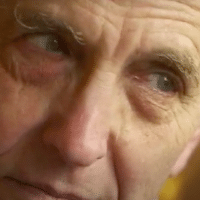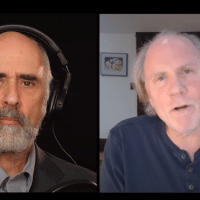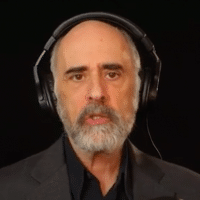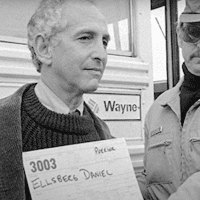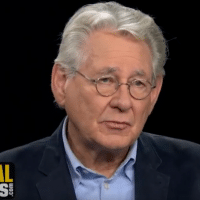-
“The Most Dangerous Man” Turns 90 – Peter Kuznick on Daniel Ellsberg
Historian Peter Kuznick looks at the significance of Daniel Ellsberg’s fight against America’s insane nuclear war strategy, his exposure of the lies of the Viet Nam War, and his continuing fight against the American war machine.
-
The decline of American Journalism
The media is driven by the enormous profits made during election campaigns. Feeding the fury and the fear of all types is just good for business. Bob McChesney joins Paul Jay on theAnalysis.news podcast.
-
Are “net-zero” emissions a smoke screen?
Peter Carter of the Climate Emergency Institute says “net zero” carbon emissions by 2050 and targeting 2 degrees warming are a recipe for runaway climate catastrophe. On theAnalysis.news podcast with Paul Jay.
-
Daniel Ellsberg on the Assange extradition and growing fascism
The week of hearings has heard evidence that exposes the charges against Assange as trumped-up and even ridiculous.
-
Is another world possible?
On Reality Asserts Itself, Prof. Leo Panitch says it’s a dilemma that the gradualism of European social-democracy and attempts at a more radical transformation have so far both failed; Panitch says a first step towards democratizing the economy is to make finance a public utility – with host Paul Jay
-
The United States and the Gulf Arab States: Interview with Adam Hanieh
Adam Hanieh: Well, we’ve seen over the last few days a wave of repression [in Bahrain] that’s ongoing, repression against the protests after the Saudi troops went in on March 15, about a month ago. As you said, there have been reports that up to 31 people have been killed during the demonstrations. And now […]
-
Who Rules Syria and How? Interview with Joshua Landis
Paul Jay: The title of your upcoming book, Syria’s Democratic Experiment, first of all, what is the experiment? And then talk a little about how we got there. Joshua Landis: Well, the book really deals with a period at the time of independence — 1946, ’45, ’46 — in Syria, when the French left and […]
-
Why Has the Syrian Opposition Failed to Grow? Interview with Bassam Haddad
Paul Jay: So, first of all, talk about what happened on Friday. The protesters, the opposition, were hoping for a big turnout, and apparently they didn’t get it. Bassam Haddad: On Friday, a few hundred people, in some places more than a thousand, came out in protest, to continue the string of protests since last […]
-
What Do the Syrians Want? Interview with Joshua Landis
Joshua Landis: Well, this [speech delivered by Syrian President Bashar al-Assad on 30 March 2011] was a classic hard-line speech. It was a nationalist speech. It was an us-against-them speech. And he rallied the nation. And that’s what he sought to do. He was fairly relaxed. He made some jokes. But he said this is […]
-
Two Scenarios for the People and the Army in Egypt: Interview with Mohammed Ezzeldin
Mohammed Ezzeldin: We have two main scenarios now regarding the relation between the people and the army. We have the Tunisian scenario. There’s a division in the ruling elites, there is division in the regime, so the army will be neutral: the tanks and soldiers and officers in the streets, they are just maintaining the […]
-
Mancession: Gender, Occupational Segregation, and the Structural Transformation of Capitalism
Paul Jay: Nancy Folbre, in her blog on the New York Times, wrote the following: “The Great Recession has sometimes been dubbed the Mancession because it drove unemployment among men higher than unemployment among women.” So how is this affecting families? How is this affecting the future outlook for the population as a whole […]
-
Who Benefits from Deflation?
Paul Jay: So if you’ve got more or less zero percent inflation and you’re getting 3 percent on your bond, you’re making 3 percent. But if inflation’s 3 percent and you’re getting 3 percent on your bond, you’re down to zero. Now, the Fed is saying that we can do this quantitative easing, increasing […]
-
The Value of Money
Paul Jay: On November 7, the president of the World Bank, Robert Zoellick, issued a statement calling for the reintroduction of some form of gold standard to establish the value of money. Why now? . . . Is Robert Zoellick’s proposal grasping at straws? Jane D’Arista: Well, what you’re saying is quite right. The […]
-
What the Republican Victory Means for US Foreign Policy
Paul Jay: Certainly President Obama had more support for the war in Afghanistan from the Republican Party than he ever did from within his own party. But might this mean increased pressure for a more aggressive stance towards Iran? . . . What’s your take? How do you think this election might affect US foreign […]
-
Emerging Markets Confront QE2: Capital Controls, Reserve Accumulation, or Both?
Paul Jay: You recently wrote a piece in the Guardian. The title is “Who Pays the Bill for the Fed’s QE2? By Depressing US Interest Rates, Quantitative Easing Forces Developing Countries to Defend Their Currencies at Crippling Cost.” What do you mean by that? Kevin P. Gallagher: One of the unintended effects of QE2 […]
-
Venezuelan Election: Victory or Setback for Chávez?
Paul Jay: Now, some of the critique is coming from the left; it’s not all coming from the right or from the elite. And I guess one of the critiques is: why isn’t there more of a rainy day fund? You know, when oil was riding high, why wasn’t there more reserves established for […]
-
New Orleans: Rebuilding on People’s Bones
Jordan Flaherty: I think some of the voices that really haven’t been heard in these five years of recovery are those that are still displaced: a hundred thousand or more former residents who were dispersed around the country in the aftermath of Katrina and still have not been able to come home. One recent […]
-
Venezuela Assembly Elections Too Close to Call
Paul Jay: So there’s elections coming up in Venezuela, September 26, for the National Assembly. Tell us who controls the National Assembly now in Venezuela and what’s at stake in these elections. Gregory Wilpert: Well, right now the National Assembly is entirely controlled by Chávez supporters. That’s because the last elections, 2005, the opposition […]
-
Will Chinese Workers Challenge Global Capitalism?
Paul Jay: In China in June, leaders of the Chinese Communist Party said that it’s time for workers’ wages to go up. And there’s been a lot of discussion about whether China’s actually restructuring its economy to try to boost domestic demand. Certainly in what leaders say in other parts of the world they […]
-
Monopoly Capital Blocks Rational Policy of Wage-led Growth
Paul Jay: So we’ve been talking about macroeconomic policy, the G-20, austerity. And there was one little line in the G-20 document I thought was interesting, and it’s sort of buried in amongst everything. It said countries could facilitate wages going up proportional to productivity, which is rather interesting, ’cause it’s the only time […]

